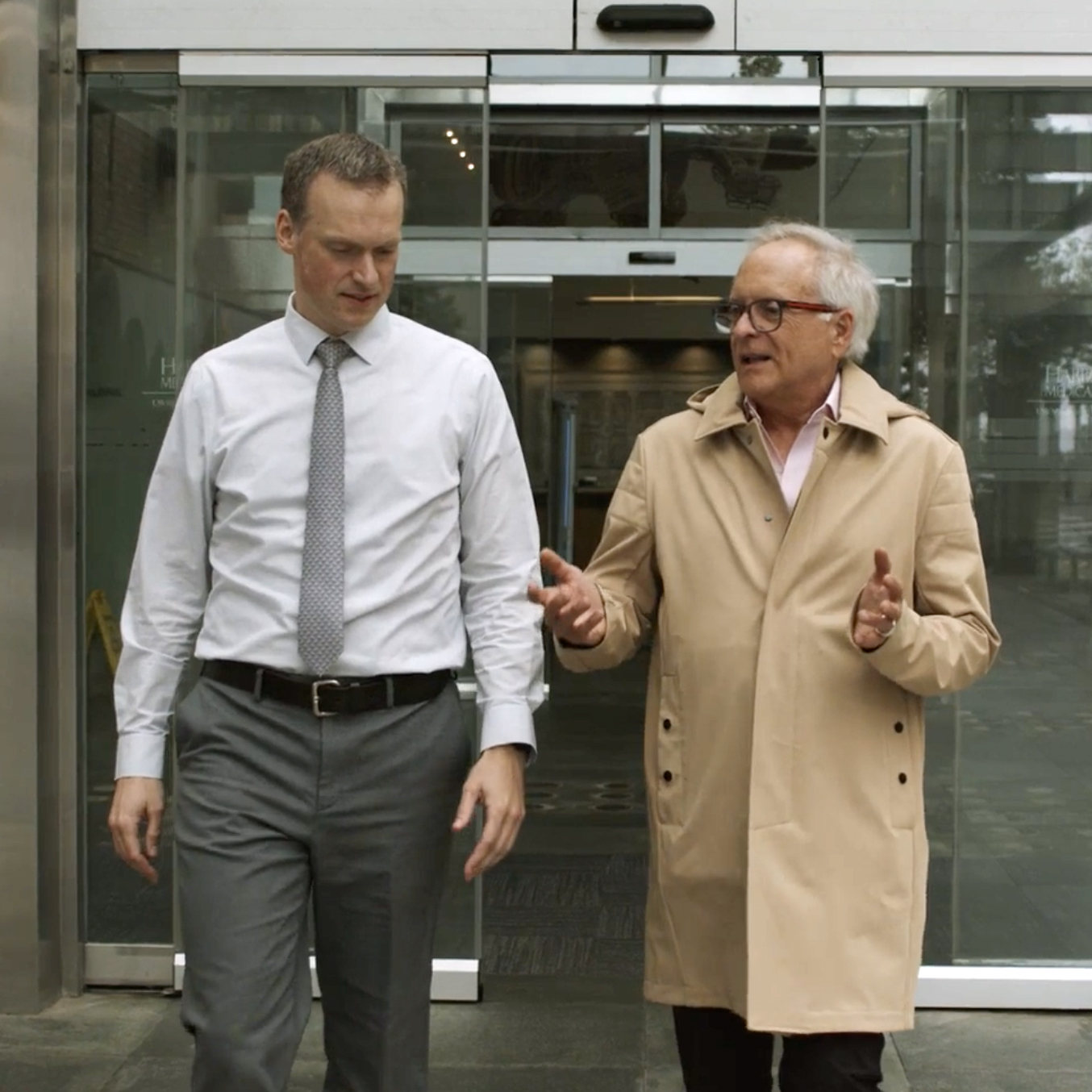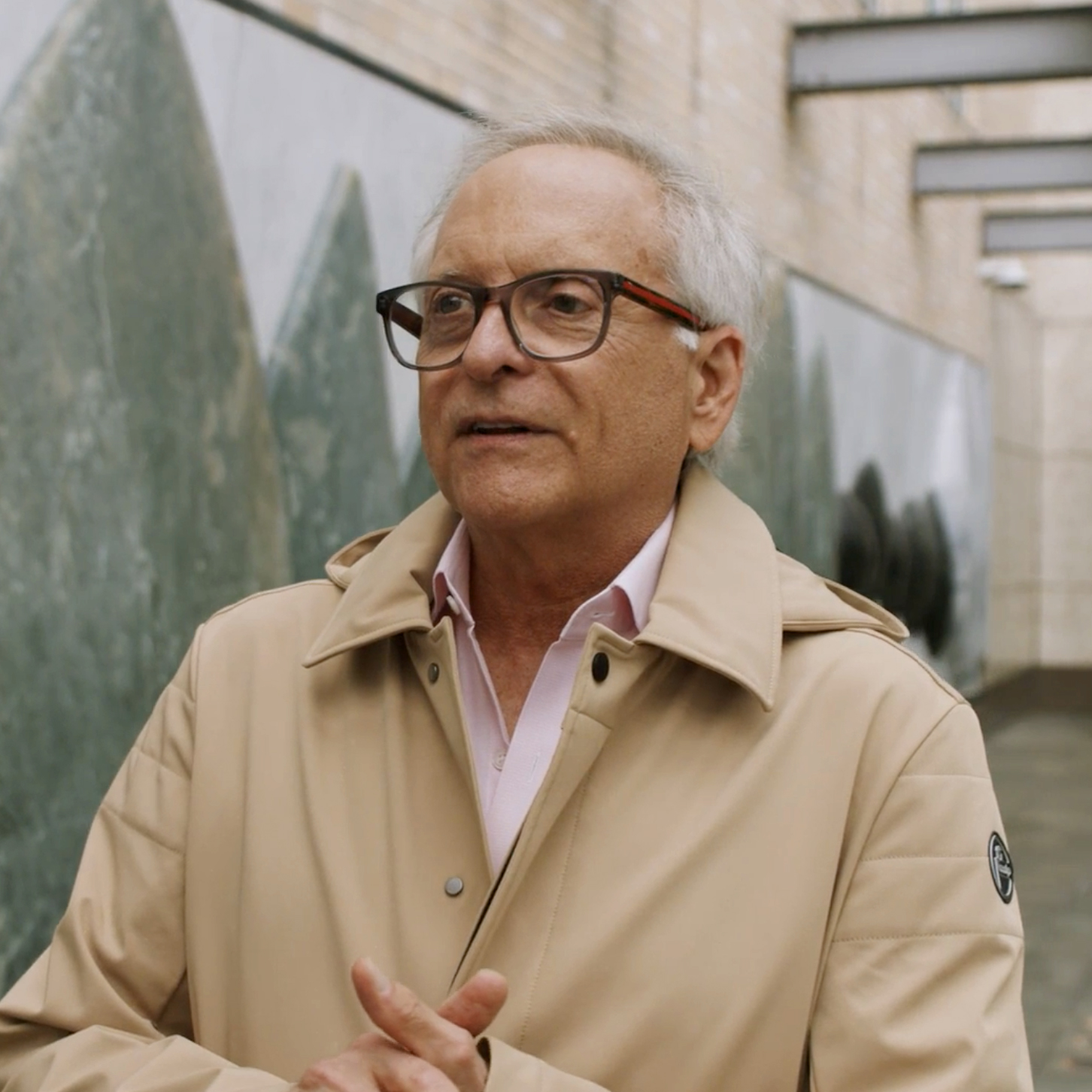Uveal melanoma, also known as ocular melanoma, is rare; only a few thousand individuals are diagnosed every year. This aggressive cancer and its treatments often lead to vision loss and a high rate of secondary metastasized cancer.
UW Medicine is transforming how we treat eye cancers, offering patients a brighter future and new possibilities for longer, healthier lives.

By focusing on personalized treatment, global collaboration and innovative research, Dr. Andrew Stacey (L) and his team are transforming care for patients like Jack Odell (R).
“At UW Medicine, we have world-class physicians and world-class facilities, which allows us to bring patients with rare tumors to one place that is quite unique in the country. It creates an opportunity for a center of excellence that is unmatched,” says Andrew Stacey, MD, MSc.
Stacey — who is the first and sole ocular oncology-focused surgeon for the Washington, Wyoming, Alaska, Montana and Idaho region — joined UW Medicine in 2016, launching the region’s only full-service comprehensive eye cancer unit at the University of Washington Eye Institute at Harborview Medical Center.
UW Medicine’s ocular oncology program is one of the few in the country with specialized expertise in these rare and often aggressive conditions. Patients have access to the latest, most effective options available, including surgery, advanced radiation therapies and precision medicine approaches that tailor treatments to individual needs.
And UW Medicine’s innovative use of proton beam therapy has revolutionized how ocular cancer is treated. Proton beam therapy treatment for ocular melanoma began in the 1970s. In 2015, researchers in UW Medicine’s radiation oncology department updated this technology with a new program that adapted modern, image-guided proton beam delivery to treat ocular melanoma.
The proton beam provides a precise, targeted approach that minimizes damage to surrounding tissues and helps patients retain their vision. While many patients with ocular melanoma have other options, for some patients, the proton beam is the only treatment modality available that can save the eye.
UW Medicine’s partnership with the Fred Hutch Cancer Center, being clinically integrated, allows patients to receive the best care. Stacey says, “With the resources that we have in our interdepartmental medical system, we are at the cutting edge of treating patients with ocular cancers. We have a world-class radiation oncology department that has built a state-of-the-art proton beam facility that we’ve been able to use in ways that have not previously been utilized throughout the country, or even the world.”
Patients with ocular cancer receive care from a team of specialists who work closely together to create a care plan that meets their unique needs. Because the ocular oncology program is part of the larger UW Medicine system, patients benefit from having specialists in various fields who collaborate on a coordinated treatment plan to ensure the best possible outcomes for primary and metastasized cancers.
As a leader in ocular cancers, UW Medicine is able to engage in groundbreaking research and select studies that can advance the standard of care, providing our patients with access to cutting-edge treatments before they are widely available.
To one patient, Jack Odell, Stacey and his team are a powerful reminder of how life-changing this care can be.
A patient’s journey with uveal melanoma
Jack Odell’s journey with ocular cancer began in 2013 when, at a routine eye exam, his doctor noticed a shadow in his eye. That shadow turned out to be uveal melanoma. A retired architect and interior designer, Odell lived an active, fulfilling life before his diagnosis, but he quickly found himself facing a serious vision health challenge.

12 years after his ocular melanoma diagnosis, Jack Odell is determined to turn his experience into a powerful advocacy platform.
Doctors gave Odell a grim prognosis: two months to two years to live. After much consideration, he opted to have proton beam radiation treatment, which required him to travel to California because there was no ocular oncology department in Washington at the time. His care team was able to stabilize his cancer, but his treatment would not end there.
In 2016, when Stacey joined UW Medicine, which had recently established an ocular cancer center, Odell was able to transfer his care to his own backyard. Under Stacey, Odell’s treatment plan evolved, providing ongoing, personalized care that included chemotherapy and other therapies, allowing him to live longer than he had ever imagined.
“Dr. Stacey is the best! The care I received at UW was invaluable,” Odell said.
Over time, however, Odell’s struggle with the disease took a toll. In 2023, while on a trip to the South Pacific, complications from the cancer developed, and his eye became seriously infected. This infection led to the difficult decision to remove his affected eye — an extremely complex surgery that took hours longer than expected because of the extent of the damage.
“I’ve never seen an eye so infected in my life, and an eye with the potential of a melanoma inside it was just a scary situation, but he was a great patient,” says Stacey.
Today — 12 years after his diagnosis and having survived far longer than expected — Odell is grateful for the care he received at UW Medicine and determined to turn his experience into a powerful advocacy platform. Now wearing a prosthetic eye, he continues to champion ocular melanoma research, speaking at conferences and sharing his story. Through his volunteer advocacy and as part of the UW Medicine Eye Institute Community Action Board, Odell has become a voice for eye health, helping to improve the lives of others facing the same diagnosis.
The genetics of retinoblastoma
Odell’s journey is a testament to the profound impact of both exceptional care and the ongoing research being done by Stacey’s team at UW Medicine.
Stacey has played a pivotal role in leading research efforts in low-resource countries that seek to improve survival rates for children with retinoblastoma, a rare type of eye cancer that develops in the retina and typically affects children under the age of 5. In the United States and other high-income countries, retinoblastoma is a highly survivable cancer, but in low-income countries, it is fatal.
“In the United States, I worry about whether my patients will have 20/20 vision, and in Africa, almost half of the patients with retinoblastoma die,” says Stacey. “There aren’t many diseases with that disparity.”
From this research, Stacey tried to find actionable problems that he could address, which led him to think about the impact of genetics. In high-income countries, DNA sequencing to determine the genetic source is a standard part of care because retinoblastoma is an inherited disease.
In partnership with Debarshi Mustafi, MD, PhD, who works with Stacey in the Department of Ophthalmology, their team was able to develop a more affordable, portable novel blood test that can determine whether a child has a cancer in the eye only or a cancer predisposition syndrome. This critical distinction greatly affects a child’s treatment and future life decisions.
The DNA signal found by Stacey and Mustafi plays a crucial role in determining the cancer’s severity and guides treatment options. With this knowledge, doctors in low-income countries can more easily diagnose and treat retinoblastoma, potentially saving lives and resources.
Stacey says, “The work in retinoblastoma is very exciting. There’s a lot we can do if we get the resources to do it.”
Donor support drives progress in research and care
By focusing on personalized treatment, global collaboration and innovative research, Stacey and his team are transforming the diagnosis and treatment of ocular cancers.
However, these rare diseases — and their treatments — are often underfunded and frequently overlooked for research grants. Pharmaceutical companies and research grant committees can be reluctant to provide funding for a disease that affects a relatively small population. As a result, research on advancing treatment has remained stagnant. Currently, in partnership with Fred Hutch Cancer Center, UW Medicine is participating in a small, ongoing clinical trial, which is investigating the first new treatment for primary uveal melanoma in 60 years.
Along with investing in research, educating new oncologists who can treat and research these diseases is critical.
“Philanthropy is the only way to get projects started, because foundation and federal grants are not going to fund a rare disease until you show some actual results in your treatment or in your data. We really need early-phase trials and early-phase research to be funded by philanthropy,” says Stacey.
Donor support helps advance this research and turn scientific discoveries into new treatments that give patients like Jack hope. As Stacey and his team continue to innovate, donor support will be essential to transforming the future of ocular oncology.
Written by Patsy Cadwell


